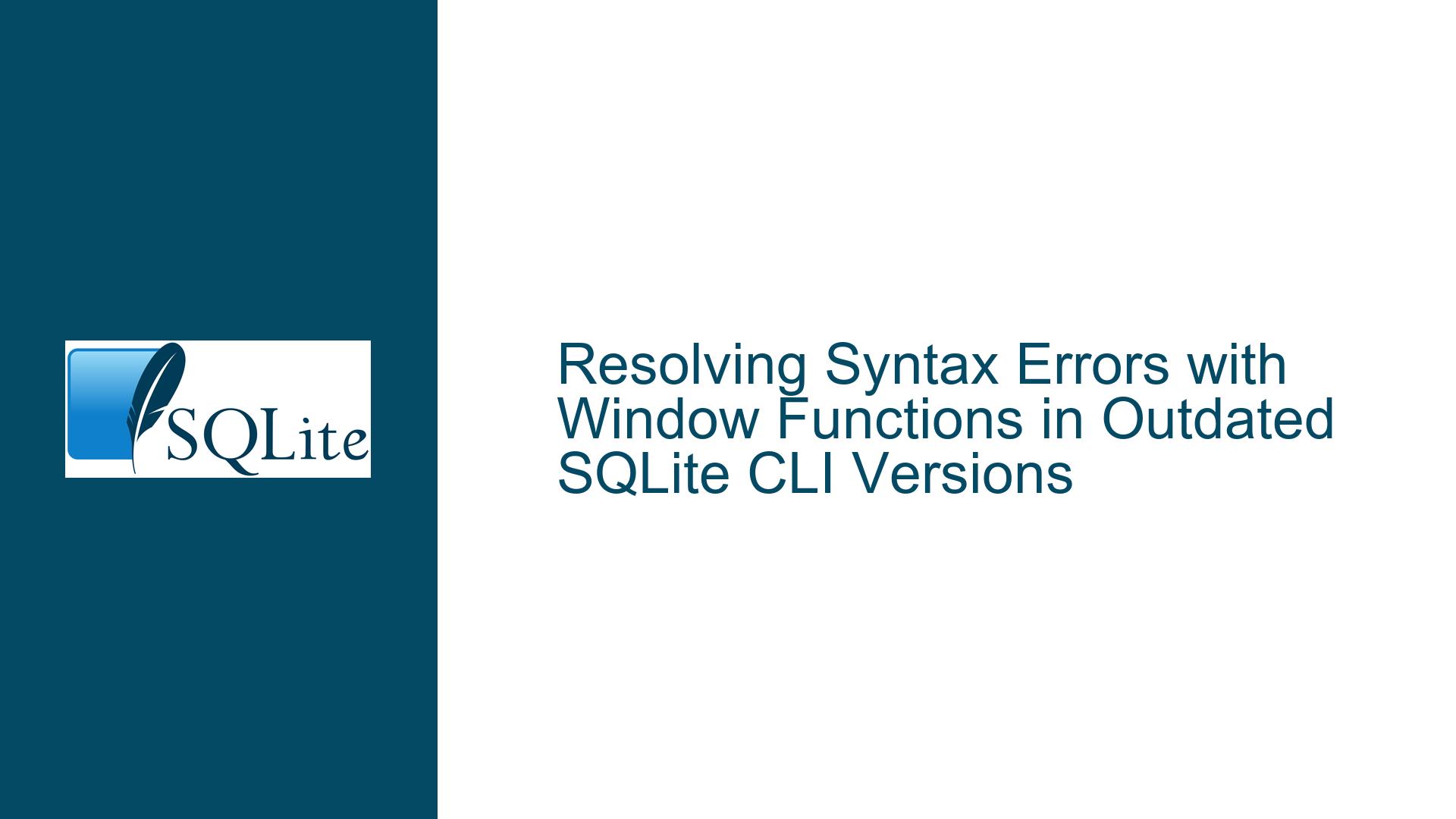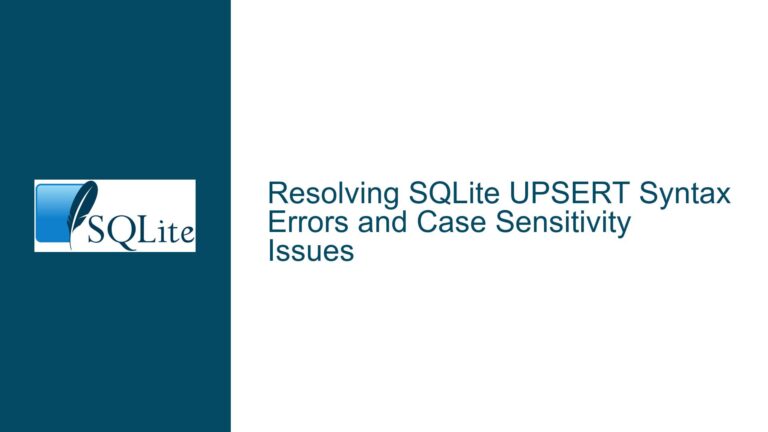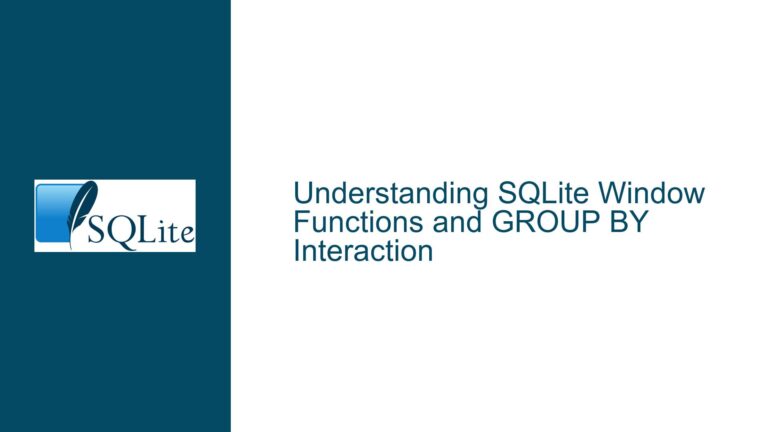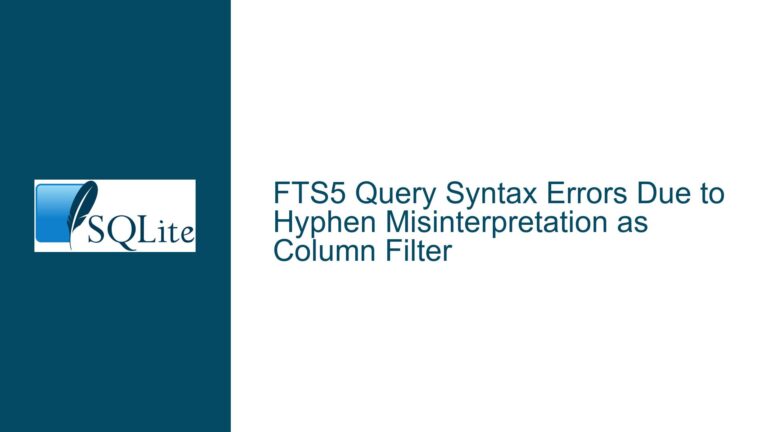Resolving Syntax Errors with Window Functions in Outdated SQLite CLI Versions
Issue Overview: Window Function Syntax Errors in Legacy SQLite CLI
The core issue encountered here involves a SQL query utilizing window functions (such as COUNT(*) OVER (PARTITION BY ...)) that executes successfully in SQLiteStudio but fails with a "syntax error near ‘(‘" message in the SQLite command-line interface (CLI). This discrepancy arises due to version mismatches between the SQLite engine embedded in SQLiteStudio and the standalone CLI tool. The problem is rooted in the use of window functions, which were introduced in SQLite 3.25.0 (2018-09-15). When executing the query in an older SQLite CLI version (e.g., 3.6.13 from 2009), the parser does not recognize the OVER clause syntax, leading to the reported error.
The confusion stems from two critical factors:
- Version Discrepancy: The user inadvertently used a severely outdated SQLite CLI (3.6.13) while assuming it matched the modern engine powering SQLiteStudio.
- Environment Path Conflicts: The system’s PATH variable prioritized an obsolete
sqlite3.exebinary over a newly installed version, creating a mismatch between the expected and actual CLI capabilities.
This issue highlights the importance of verifying SQLite version compatibility when using advanced SQL features like window functions, which are not backward-compatible with pre-3.25.0 releases. The error message itself ("near ‘(‘: syntax error") is misleading because it points to the opening parenthesis of the OVER clause rather than explicitly stating that window functions are unsupported. This ambiguity complicates debugging for users unfamiliar with SQLite’s version-specific syntax support.
Possible Causes: Version Mismatch and Path Configuration Errors
1. Outdated SQLite CLI Version
SQLite’s window functions were added in version 3.25.0. Prior versions lack support for the OVER clause, treating it as invalid syntax. The user’s CLI reported version 3.6.13, released in 2009, which predates window functions by nearly a decade. This version disparity explains why the query failed in the CLI but succeeded in SQLiteStudio, which likely bundled a newer SQLite engine (e.g., 3.43.2).
2. Incorrect Binary Execution Due to Path Configuration
Package managers like Scoop install software to user-specific directories (e.g., ~\scoop\apps\sqlite\current\). However, if the system’s PATH environment variable includes directories containing older SQLite binaries (e.g., legacy tools in C:\Windows\System32), typing sqlite3 in the CLI may execute the outdated binary instead of the newly installed one. This conflict caused the user to unknowingly run version 3.6.13 despite Scoop’s correct installation of 3.43.2.
3. Misleading Error Message Obscuring Root Cause
The syntax error message (“near ‘(’”) arises because the parser in SQLite 3.6.13 does not recognize the OVER keyword. It interprets the opening parenthesis after COUNT(*) as the start of a function call (e.g., COUNT(*) AS n), leading to confusion. Modern SQLite versions (≥3.25.0) parse the OVER clause correctly, making the query valid.
Troubleshooting Steps, Solutions & Fixes: Resolving Version Conflicts and Syntax Issues
Step 1: Verify the Active SQLite CLI Version
Execute sqlite3 --version in the command prompt to confirm the active version. If the output shows a version older than 3.25.0 (e.g., 3.6.13), proceed to Step 2.
Example Output for Outdated Version:
SQLite version 3.6.13
Enter ".help" for instructions
Example Output for Modern Version:
SQLite version 3.43.2 2023-10-10 12:14:04
Enter ".help" for usage hints.
Step 2: Resolve Path Conflicts to Prioritize the Correct Binary
Locate the Newly Installed SQLite Binary:
- For Scoop installations: Check
~\scoop\apps\sqlite\current\sqlite3.exe. - For manual installations: Navigate to the directory where the modern SQLite CLI was installed.
- For Scoop installations: Check
Update the System PATH Variable:
- Temporarily override the PATH in the current session:
set PATH=C:\path\to\modern\sqlite;%PATH% - Permanently adjust the PATH (Windows):
- Open System Properties > Environment Variables.
- Edit the “Path” variable under “User variables” to prepend the directory containing the modern SQLite binary.
- Temporarily override the PATH in the current session:
Use the Full Binary Path Explicitly:
Execute the CLI using its absolute path to bypass PATH conflicts:C:\Users\YourUser\scoop\apps\sqlite\current\sqlite3.exe your_database.db
Step 3: Re-Execute the Query with Window Functions
After ensuring the correct SQLite version is active, rerun the original query. The window functions should now execute without syntax errors.
Example Valid Output (Truncated):
BRAVO PIZZA|5145 MISSION St|3|88.7|82|92
S.F. Pizza|1270 Mission St.|3|84.3|81|91
...
Step 4: Cross-Check SQLite Versions Across Tools
SQLiteStudio and other GUI tools often bundle their own SQLite engines. To avoid discrepancies:
- Check SQLiteStudio’s Embedded Version:
ExecuteSELECT sqlite_version();within SQLiteStudio. - Ensure CLI and GUI Tools Use Compatible Versions:
Align all tools to use SQLite ≥3.25.0 if relying on window functions.
Step 5: Update Legacy SQLite Installations
If outdated SQLite binaries exist in system directories (e.g., C:\Windows\System32):
- Rename or Remove Obsolete Binaries:
- Navigate to the directory containing
sqlite3.exe. - Rename the file to
sqlite3_legacy.exeto prevent accidental execution.
- Navigate to the directory containing
- Reinstall Modern SQLite CLI:
Use package managers (Scoop, Chocolatey) or download binaries directly from sqlite.org.
Step 6: Address Secondary Syntax Pitfalls (Optional)
While not the root cause here, the original query used double quotes ("MISSION ST%") for string literals. Although SQLite tolerates this in some configurations, standard SQL requires single quotes ('MISSION ST%'). Update the query for robustness:
WHERE upper(b.address) LIKE '%MISSION ST%'
AND upper(b.name) LIKE '%PIZZ%'
Step 7: Validate Query Compatibility with Target SQLite Versions
For distributed applications or educational materials:
- Specify Minimum SQLite Version:
Clearly document that window functions require SQLite ≥3.25.0. - Provide Fallback Queries for Legacy Versions:
Rewrite the window function logic using subqueries or CTEs for compatibility with older versions:SELECT b.name, b.address, (SELECT COUNT(*) FROM inspections i WHERE i.business_id = b.business_id) AS n, (SELECT ROUND(AVG(i.score), 1) FROM inspections i WHERE i.business_id = b.business_id) AS avgscore, ... FROM businesses b WHERE ...
By systematically addressing version mismatches, resolving path conflicts, and validating query compatibility, users can eliminate syntax errors related to window functions and ensure consistent behavior across SQLite environments.






